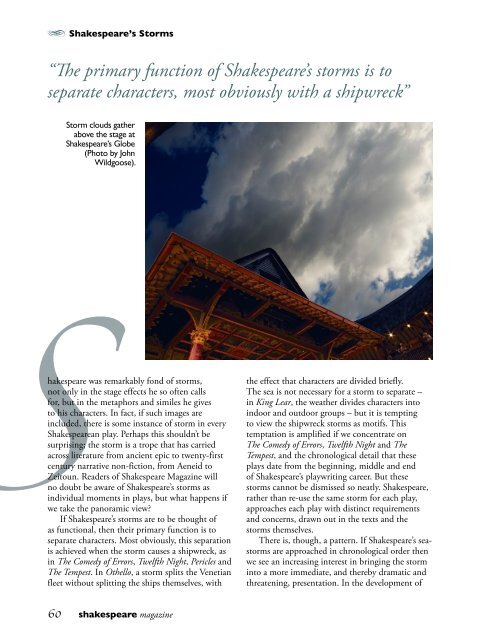Shakespeare Magazine 12
Shakespeare’s Sisters is the theme of Shakespeare Magazine 12. Our cover stars – Harriet Walter, Judi Dench, Sophie Okonedo and Margaret Atwood – all speak with authority, insight and wit about their adventures with the Bard. Also this issue, we have Jade Anouka’s Donmar Shakespeare in pictures, while Hugh Bonneville and Benedict Cumberbatch chat about The Hollow Crown. We have brilliant guest essays on Shakespeare’s Storms and How to think like Shakespeare, along with John Foxx’s Arden Shakespeare cover art, the madcap comedy world of the Reduced Shakespeare Company, and Benedict Cumberbatch stars in a Doctor Strange/Shakespeare mash-up!
Shakespeare’s Sisters is the theme of Shakespeare Magazine 12.
Our cover stars – Harriet Walter, Judi Dench, Sophie Okonedo and Margaret Atwood – all speak with authority, insight and wit about their adventures with the Bard.
Also this issue, we have Jade Anouka’s Donmar Shakespeare in pictures, while Hugh Bonneville and Benedict Cumberbatch chat about The Hollow Crown.
We have brilliant guest essays on Shakespeare’s Storms and How to think like Shakespeare, along with John Foxx’s Arden Shakespeare cover art, the madcap comedy world of the Reduced Shakespeare Company, and Benedict Cumberbatch stars in a Doctor Strange/Shakespeare mash-up!
Create successful ePaper yourself
Turn your PDF publications into a flip-book with our unique Google optimized e-Paper software.
<strong>Shakespeare</strong>’s Storms<br />
“The primary function of <strong>Shakespeare</strong>’s storms is to<br />
separate characters, most obviously with a shipwreck”<br />
Storm clouds gather<br />
above the stage at<br />
<strong>Shakespeare</strong>’s Globe<br />
(Photo by John<br />
Wildgoose).<br />
hakespeare was remarkably fond of storms,<br />
not only in the stage effects he so often calls<br />
for, but in the metaphors and similes he gives<br />
to his characters. In fact, if such images are<br />
included, there is some instance of storm in every<br />
<strong>Shakespeare</strong>an play. Perhaps this shouldn’t be<br />
surprising; the storm is a trope that has carried<br />
across literature from ancient epic to twenty-first<br />
century narrative non-fiction, from Aeneid to<br />
Zeitoun. Readers of <strong>Shakespeare</strong> <strong>Magazine</strong> will<br />
no doubt be aware of <strong>Shakespeare</strong>’s storms as<br />
individual moments in plays, but what happens if<br />
we take the panoramic view?<br />
If <strong>Shakespeare</strong>’s storms are to be thought of<br />
as functional, then their primary function is to<br />
separate characters. Most obviously, this separation<br />
is achieved when the storm causes a shipwreck, as<br />
in The Comedy of Errors, Twelfth Night, Pericles and<br />
The Tempest. In Othello, a storm splits the Venetian<br />
fleet without splitting the ships themselves, with<br />
the effect that characters are divided briefly.<br />
The sea is not necessary for a storm to separate –<br />
in King Lear, the weather divides characters into<br />
indoor and outdoor groups – but it is tempting<br />
to view the shipwreck storms as motifs. This<br />
temptation is amplified if we concentrate on<br />
The Comedy of Errors, Twelfth Night and The<br />
Tempest, and the chronological detail that these<br />
plays date from the beginning, middle and end<br />
of <strong>Shakespeare</strong>’s playwriting career. But these<br />
storms cannot be dismissed so neatly. <strong>Shakespeare</strong>,<br />
rather than re-use the same storm for each play,<br />
approaches each play with distinct requirements<br />
and concerns, drawn out in the texts and the<br />
storms themselves.<br />
There is, though, a pattern. If <strong>Shakespeare</strong>’s seastorms<br />
are approached in chronological order then<br />
we see an increasing interest in bringing the storm<br />
into a more immediate, and thereby dramatic and<br />
threatening, presentation. In the development of<br />
60<br />
shakespeare magazine

















